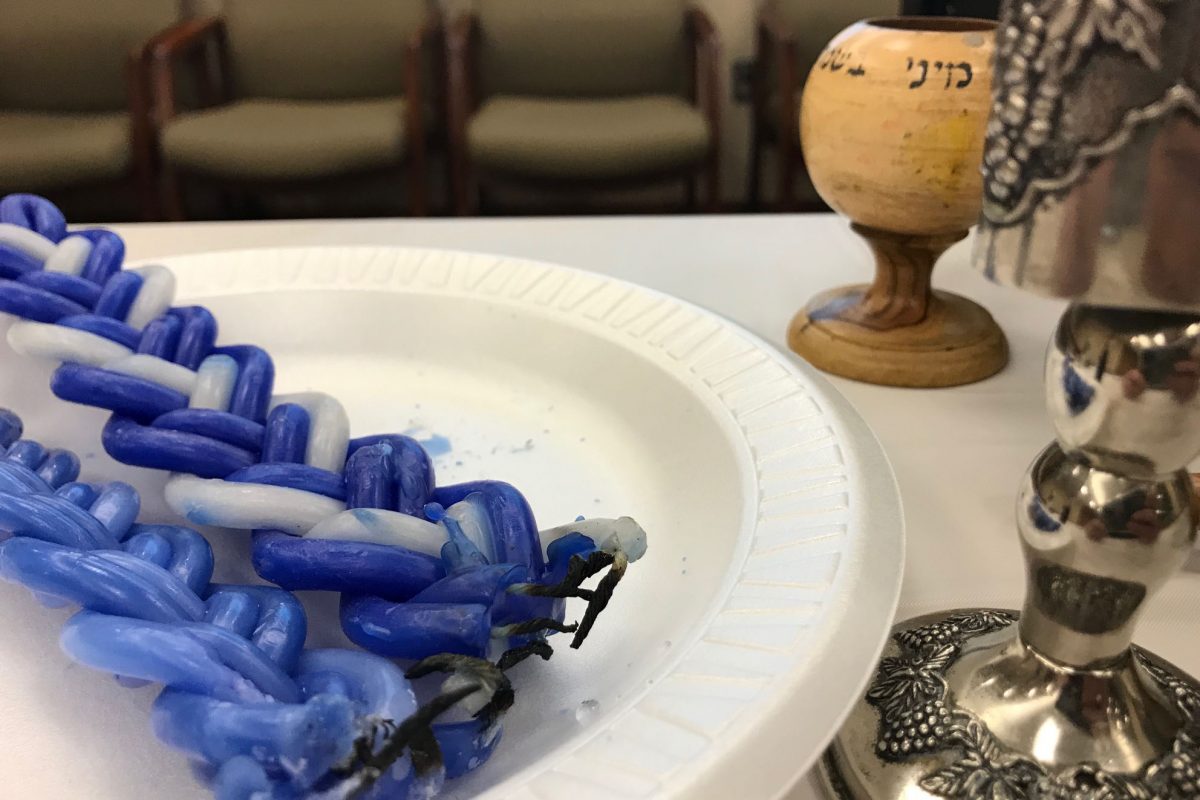Sixth installment in an ongoing series.
I had a bad case of the Mondays by the time I got to Rabbi Eli Yoggev’s Judaism for Beginners class at Beth Tfiloh on Jan. 21.
Not only was it Martin Luther King Jr. Day, which comes with its own heavy sort of spiritual weight, but it was also Tu B’Shevat. Yes, the New Year of the Trees is usually a minor holiday on the Hebrew calendar, but I happened to commit a major faux pas on that day of all days. I accidentally left a jade tree out on my sun porch. Then the temperature dropped to polar ice cap and I killed a tree.
On the holiday for the trees. Ugh! Such a bad Jew.
Fortunately, since this Monday couldn’t get much blue-er, we were ready to dive into Shabbat (which means to rest from being overly engaged in the world)! Everybody challah!

Rabbi Yoggev set up all sorts of Shabbat paraphernalia: Two challahs (because God rained down a double amount of dew-covered manna every Friday afternoon when the Jews were in the desert), candles, salt, spices (there’s a whole thing about how they revive your soul), a Havdalah candle (you have to have more than one wick to provide a significant light source), a Kiddush cup and wine.
Then he explained that there are two types of commandments for Shabbat. The Negative Commandments are about guarding (not desecrating) the Shabbat. The positive commandments are about remembering (enhancing and enjoying) the Shabbat. “They go together,” Rabbi Yoggev said. “If you stop at [guarding], you defeat the whole purpose.”
A-Ha! At that moment, I had an epiphany. As a teenager, visiting my religious relatives for holidays or long weekends, I would often turn off a bathroom light (either absentmindedly or due to muscle memory) or I’d go into my bedroom to write myself a note or I’d want to go buy a slice of pizza. I knew I wasn’t supposed to do any of these things and I was often told as much, but I was never really presented with any rational explanations and, ultimately, I sort of became turned off to the entire process.
So, why are there so many things we can’t do on Shabbat? As Rabbi Yoggev tells it, there are 39 Melachot (these are the 39 types of labor you’re not allowed to do on Shabbat). They include tasks that fall under the categories of Field Work, Making Material Curtains, Making the Beams of the Mishkan (hang on, I’ll get to this in a sec), Putting Up and Taking Down the Mishkan and the Mishkan’s Final Touches.
OK, so what is this Mishkan? It’s was a Tabernacle, a portable temple that had to be carried in the desert and constructed, along the way, like a religious M.A.S.H. unit. It shows up in Exodus and if it was done in the Mishkan, it can’t be done on Shabbat.

“You can move furniture in your house all day and not desecrate the Torah,” Rabbi Yoggev said, but leave the house carrying a pin into a public space and you’ve broken the rules. No sewing, kneading, baking, cleaning, dying, weaving, cutting, slaughtering, writing, erasing, building, breaking down, extinguishing, kindling, blowing, carrying, etc.
I never knew this, but apparently you’re not even supposed to rip toilet paper on Shabbat. Some people pre-tear it or some use tissues. This rule sent me reeling into an angsty downward spiral. Was I supposed to have been using tissues all those years at my grandparents’ house? Were they assuming I was? At some point, as all these rules were sinking in, I think I started to exhibit symptoms of PTSD (Post Traumatic Shabbat Disorder), but I was still with Rabbi Yoggev until he told me he doesn’t take hot showers on Shabbat. Nope, I’m out. Line drawn.
As I was having slow-motion flashbacks, we moved on to the remembering portion of the class. Rabbi Yoggev said Shabbat “can become something you look forward to all week.” Some of the things you can do to enhance your experience include dressing nicely, eating well, taking a walk, reading a book, playing a board game, sleeping and having conjugal relations. So, there’s the appeal. Things can get freaky on Shabbat! Though that sort of begs the question about weekday conjugal relations.
Most of us have heard the headline about how God worked all week, then rested on the 7th day. This is related to why we observe Shabbat: For physical rest, as a return to ourselves, to recharge our spiritual batteries and to reaffirm that God is in charge of our lives.
The Talmudic Rabbis suggest giving honor to Shabbat by cleaning and organizing in advance, putting aside a favorite snack or type of wine (say out loud: “This is for the Sabbath.”) and coming to the table with an appetite (can do). Leading up to Friday nights, Rabbi Yoggev likes to light incense, play music and prepare something to say at the table that sparks conversation. (That just sounds like a really fun dinner party to me.)
It occurs to me that I’ve been doing most of these things for a long time. I’m Shomer Shabbos and I didn’t even know it – well except for the toilet paper and hot shower thing – oh, and praying. While Rabbi Yoggev demonstrated the ceremonial aspects of Shabbat, he mentioned that you often fill the kiddush cup up to the rim or even overflowing with wine. This was my biggest takeaway of the night. All these years, I assumed my relatives were just sloppy drunks who couldn’t properly pour a glass of wine. I mean the white tablecloths were always spattered with drips of red wine. I had no idea this was on purpose! I think I owe some people some apologies.
Rabbi Yoggev and I had a breakthrough during this class. It’s a good thing, too, since there are only three classes left and he was probably starting to think I was a lost cause. Well, actually, I am a lost cause but now at least I have a greater understanding. I now have the explanations for what was wrong with doing all the things I kept doing as a teenager in my grandparents’ home. And, I have a better appreciation for the good parts of Shabbat. Rabbi Yoggev worked his Rabbi voodoo on me and broke through. It was like a therapy session.
I don’t know about him, but I feel great and can’t wait to do some eating, reading, sleeping and, uh, other stuff this weekend.
Shabbat Shalom!
Next up: Jan. 28 — Festivals
[box type=”shadow”]Here’s the original class schedule:
Basics —
Nov. 19: What You Need to Know About Judaism,
Nov. 26: Foundations of Jewish Belief,
Dec. 3: Jewish History 101
Jewish Life and Spirituality —
Dec. 10: Daily Jewish Living,
Dec. 17: Life Cycle Events,
Dec. 24: Prayer,
Jan. 7: Jewish Spirituality
Practical Judaism —
Jan. 14: Introduction to Jewish Law and Custom,
Jan. 21: Shabbat,
Jan. 28: Festivals
Judaism for Today —
Feb. 4: Hot Button Issues,
Feb. 11: “Ask the Rabbi” Session
For more information, contact eyoggev@btfiloh.org.
[/box]





